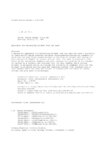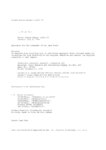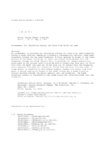TO
Filters: Collection: "ir_eua" Year Start: 1960
| Title | Date | Subject | Description | ||
|---|---|---|---|---|---|
| 126 |
 |
Apparatus for extracting bitumen from tar sand | 1982-01-19 | Patent; Extracting bitumen from tar sand; Extraction chambers; Countercurrent flow; Plurality; Individually sealed pressure adjusted interconnected extraction chambers in series; Tar sand; Bitumen | A method and apparatus for extracting bitumen from tar sand utilizes a plurality of individually sealed pressure adjusted interconnected extraction chambers in which the tar sand flows countercurrent to the flow of solvent with mixing in each extraction chamber of solvent and tar sand. Tar sand is p... |
| 127 |
 |
Apparatus for separating organic material from particulate tar sands and coal and agglomeration of the particulate residue | 1976-10-05 | Patent; Tar sands; Coal; Agglomeration of particle residue; Agglomerating liquid; Immiscible; Varsol; Ball agglomerates | A rotatable drum having an interior which tapers in a horizontal direction has a first port at the smaller end for receiving particulate Tar Sands or coal, and an agglomerating liquid, e.g. water, and a second port at the larger end for receiving an organic material separating liquid, e.g. Varsol, w... |
| 128 |
 |
Apparatus for the treatment of tar sand froth | 1976-07-06 | Patent; Tar Sand Froth; Improved recycling disc-type centrifuge; Converting flow direction; Recycled underflow | An improved disc recycling type of centrifuge apparatus which includes means for converting the flow direction of the recycled underflow and causing the recycled underflow to self impact. |
| 129 |
 |
Appendix 1: User guide for characterizing particulate matter | 2003-09 | Air quality; Particulate matter; PM; Characterizing particulate matter; Sampling PM; PM background; Photoacoustic analyzer; PA; Photoelectric Aerosol Sensor; PAS; PAH; Aerosol time-of-flight mass spectrometer; ATOFMS; Dilution and Sampling; Soil; Dust; Smoke; Liquid droplets; Atmosphere; Nitrate; Su... | This User's Guide is intended to assist environmental or military personnel who work with air quality measurements, regulations, and planning for the Department of Defense. Specifically, it focuses on an evaluation of three newly developed instruments for characterizing particulate matter (PM), gene... |
| 130 |
 |
APPENDIX A - Analysis of environmental, legal, socioeconomic and policy issues critical to the development of commercial oil shale leasing on the public lands in Colorado, Utah and Wyoming under the mandates of the Energy Policy Act of 2005 - Final Project Report - Reporting period: June 21, 2006 to October 21, 2009 | 2009-10 | Oil shale; Colorado; Utah; Wyoming; Energy Policy Act of 2005; Green River Formation; Environmental; Legal; Socioeconomic; Policy Issues; Oil shale deposits; BLM; Bureau of Land Management | The United States is home to the largest oil shale deposits in the world. This resource is located in the Green River Formation, spreading across the states of Colorado, Utah and Wyoming. Despite the vast potential of this resource, successful commercial development has yet to occur. To date, concer... |
| 131 |
 |
APPENDIX B - Depositional heterogeneity and fluid flow modeling of the oil shale interval of the upper Green River Formation, eastern Uinta Basin, Utah - Final Project Report - Reporting period: June 21, 2006 to October 21, 2009 | 2009-10 | Green River Formation; Uinta Basin; Utah; Uintah County; Oil shale; Deposition | In this project, a detailed geological analysis was performed followed by a reservoir modeling exercise. For the geological analysis, ~300 m of cores were correlated to gamma and density logs in well P4 in the lower to middle Eocene (49.5-48.0 million years ago (Ma)), upper Green River Formation of ... |
| 132 |
 |
APPENDIX C - In-situ production of Utah oil sands - Final Project Report - Reporting period: June 21, 2006 to October 21, 2009 | 2009-10 | Utah; Uinta Basin; Oil sand reservoirs; Whiterocks; Sunnyside; Oil; Oil extraction; In-situ; Heavy oil production; Bitumen | Two oil sand reservoirs located in Utah's Uinta Basin were considered for analysis: Whiterocks, a small, steeply dipping, contained reservoir containing about 100 million barrels, and Sunnyside, a giant reservoir containing over four billion barrels of oil in place. Cyclic steam stimulation, steam a... |
| 133 |
 |
APPENDIX D - Meeting data needs to perform a water impact assessment for oil shale development in the Uinta and Piceance Basins, A subpart of project - Quantifying water availability impacts and protecting water quality while developing Utah oil shale and sands - Final Project Report - Reporting period: June 21, 2006 to October 21, 2009 | 2009-06-23 | Uinta Basin; Piceance Basins; Water impact assessments; Oil shale development | The goal of this project was to mitigate water resources impacts from oil shale development in the U.S. by compiling geospatial data and water use estimates to assess water availability impacts. |
| 134 |
 |
APPENDIX E - Integrated treatment of produced water by chemical and biological unit operations, A subpart of project - Quantifying water availability impacts and protecting water quality while developing Utah oil shale and sands - Final Project Report - Reporting period: June 21st, 2006 to October 21st, 2009 | 2010-10-07 | Water treatment; Water quality - Utah; Oil shale and sands | Water generated along with oil, gas, and coal bed methane production is commonly known as produced water, formation water, or oilfield brine [1]. Produced water represents the largest waste stream volume in production operations on most offshore platforms [2]. According to the American Petroleum Ins... |
| 135 |
 |
APPENDIX F - Bitumen extraction and treatment and reuse of process water - A subpart of project quantifying water availability impacts and protecting water quality while developing Utah oil shale and sands - Final project report - Reporting period: June 21, 2006 to October 21, 2009 | 2009-04-13 | Produced water from gas and crude oil production is voluminous, requiring extensive treatment before it can be safely discharged or reused. This project has used a newly developed pressure-assisted ozonation technology to remove oil from water and prevent oil sheen at the water surface. The new proc... | |
| 136 |
 |
APPENDIX G - Detailed study of shale pyrolysis for oil production - A subpart of project oil shale pyrolysis and in situ modeling - Final Project Report - Reporting period: June 21, 2006 to October 21, 2009 | 2009-04-21 | Oil production; Shale assessment | The oil shale industry is going through a revolution of sorts. After the oil crisis in the 1970s, a great deal of effort was spent on research and development and on pilot scale technologies. Extensive research was conducted with on-surface and in-situ production methods. Even though some large pilo... |
| 137 |
 |
Application of a self-adaptive detector system on a triple quadrupole ms/ms to high explosives and sulfur-containing pyrolysis gases from oil shale | 1983-12 | A totally computerized triple quadrupole MS/MS is being extended into a dynamic, self-adaptive chemical analysis system at Lawrence Livermore National Laboratory. These first efforts toward Artificial Intelligence guided instrumentation (i.e. Expert Systems) involve the implementation of a self-adap... | |
| 138 |
 |
Appraisal of the technical and economic potential of U.S. tar sands | 1986-11 | U.S. tar sands constitute a large, essentially undeveloped resource that could, with technological advances. provide an important source for future liquid supplies of petroleum. The identified resource base, as reported in the update to the 19B3 report by the Interstate Oil Compact Commission (IDCC)... | |
| 139 |
 |
Areawide and local effects of tar sands development at the Sunnyside site in Utah: A socioeconomic analysis | 1984-04 | The Combined Hydrocarbon Leasing Act of 1982 (Public Law 97-78) provides guidelines for converting federal oil and gas leases to combined hydrocarbon leases in Special Tar Sands Areas (STSAs). The STSAs are designated by the U.S. Department of the Interior as areas that contain substantial deposits ... | |
| 140 |
 |
Arrangement for recovering viscous petroleum from thick tar sand | 1977-05-03 | Patent; Viscous oil; Tar sand; Petroleum; Recovering viscous petroleum; Large vertical dimension; Tubular member | An arrangement is provided for recovering viscous oil from a tar sand formation having a large vertical dimension including a substantially vertical lined shaft extending through the tar sand formation. A first opening is formed in the lower portion of the shaft lining and at least one lateral hole ... |
| 141 |
 |
ASCRS/ESCRS Survey on Foldable IOLs Requiring Explantation or Secondary Intervention 2005 Update | 2006-03-16 | ASCRS; ESCRS; Survey; Foldable IOLs | This presentation provides updates on the ASCRS/ESCRS Survey on Foldable IOLs Requiring Explantation or Secondary Intervention |
| 142 |
 |
ASCRS/ESCRS Survey on Foldable IOLs Requiring Explantation or Secondary Intervention 2005 Update | 2006-03-16 | ASCRS; ESCRS; Survey; Foldable IOLs | Presentation in 2005 discussing foldable IOL's in ophthalmology. |
| 143 |
 |
ASCRS/ESCRS Survey on Foldable IOLs Requiring Explantation or Secondary Intervention 2005 Update | 2006-03-16 | ASCRS; ESCRS; Survey; Foldable IOLs | This presentation provides updates on ASCRS/ESCRS Survey on Foldable IOLs Requiring Explantation or Secondary Intervention |
| 144 |
 |
ASCRS/ESCRS Survey on Foldable IOLs Requiring Explantation or Secondary Intervention 2005 Update | 2006-03-16 | ASCRS; ESCRS; Survey; Foldable IOLs | This presentation provides updates on ASCRS/ESCRS Survey on Foldable IOLs Requiring Explantation or Secondary Intervention |
| 145 |
 |
ASCRS/ESCRS Survey on Foldable IOLs Requiring Explantation or Secondary Intervention 2005 Update | 2006-03-16 | ASCRS; ESCRS; Survey; Foldable IOLs | A 2005 presentation with the Intermountain Ocular Research Center of the University of Utah on the complications of IOL removal. |
| 146 |
 |
Asphalt from Utah tar sands -- A JWBA project sponsored by the U.S. Department of Energy | 1989 | asphalt; Utah tar sands; JWBA project; asphalt production | JWBA has initiated a project for development of Utah's tar sands for production of specification-grade asphalt. Projected prices and costs strongly indicate economic viability within the market limitations. JWBA has licensed the water extraction technology developed at the University of Utah and has... |
| 147 |
 |
Asphalt Wash 1 (U086) - Plate 9 | 2014 | Green River Formation; well log; core log; Asphalt Wash 1; plate 9 | |
| 148 |
 |
Asphalt Wash 1 XRF depth plots | 2014 | Asphalt Wash; depth plots | |
| 149 |
 |
Asphaltene rejection from bitumens via supercritical fluid extraction | 1993 | asphaltene rejection; bitumen; supercritical fluid extraction; SFE; asphaltene content | Supercritical fluid extraction (SFE) of bitumen was carried out in a continuous extractor using propane as the solvent at several temperatures and pressures. The asphaltene contents of the residual fractions in the extractor were compared to the asphaltene content of the original bitumen. Asphaltene... |
| 150 |
 |
Assay products from Green River oil shale | 1986-02-18 | Pyrolysis stoichiometry; Green River; Oil shale; Oil; Mahogany zone; Colorado; Utah; Pairwise correlation coefficients; Pyrolysis; Elemental analyses of shales and oils; Organic carbon; Gas composition; Elemental composition; Oil shale grade; Raw shale | Data from 66 material-balanced assays conducted at Lawrence Livermore National Laboratory, Laramie Energy Technology Center, and The Oil shale Corporation were compiled and analyzed to determine the pyrolysis stoichiometry for Green River formation oil shales originating in and near the Mahogany zon... |
